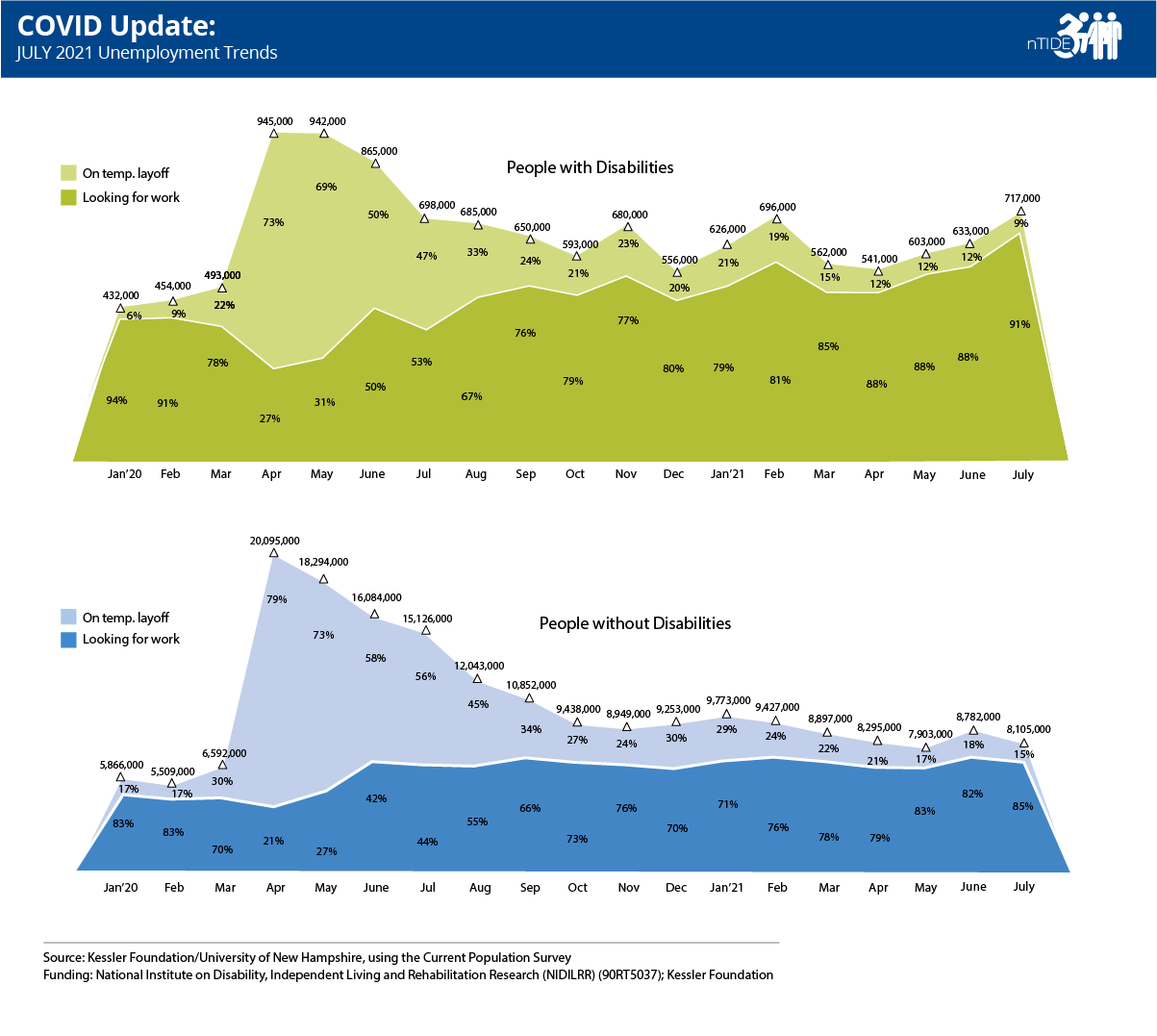nTIDE July 2021 COVID Update: Unemployment rises again for people with disabilities
National Trends in Disability Employment (nTIDE) – issued semi-monthly by Kessler Foundation and the University of New Hampshire
East Hanover, NJ. August 24, 2021. For the third consecutive month, unemployment has risen for people with disabilities, according to today’s National Trends in Disability Employment (nTIDE) COVID Update, while unemployment continued to decline for people without disabilities, as the evolving pandemic continues to challenge workers and employers.
In April of 2020, restrictions on economic activity in the U.S. due to the COVID-19 pandemic precipitated an unprecedented rise in furloughs and people looking for work, prompting the addition of this mid-month nTIDE COVID Update. The mid-month nTIDE follows two key unemployment indicators – furloughs, or temporary layoffs, and the number of people looking for work, comparing trends for people with and without disabilities.
This graphic compares the impact of the COVID-19 pandemic on people with and without disabilities, capturing pre-pandemic and current unemployment data for January 2020 to July 2021. Unemployment for people with disabilities rose for the third consecutive month, raising concerns about their ability to maintain jobs as the pandemic affects economic activity.
July's nTIDE COVID Update graphic, in contrast to the previous month, shows divergence between the two groups, a cause for concern for economist Andrew Houtenville, PhD, research director of the University of New Hampshire Institute on Disability, and co-author of nTIDE. The number of unemployed people with disabilities rose to 717,000 in July, continuing the slow rise that began in the spring. “That's as high as in July 2020,” noted Dr. Houtenville, “just two months after the economic lockdown. We seem to have reached a new normal for the unemployed with disabilities, with numbers stabilizing above pre-pandemic levels, in the range of 600,000 to 700,000. July's increase is worrisome,” he continued, “since it precedes the surge in infections due to the Delta variant. The big question, however, is why we are not seeing this rise in unemployment among people without disabilities,” he remarked.
The root of the problem may be fundamental changes in what Dr. Houtenville calls "the ecology of employment." For workers with disabilities, that ecology involves families, caregivers, service providers, job coaches, financial aid, and support services, as well as employers. At every layer, the pandemic exerts direct and indirect influences that affect their ability to maintain employment.
Notes from the Field
The evolving pandemic complicates what was already a complex ecology, according to disability employment expert John O'Neill, PhD, director of the Center for Employment and Disability Research at Kessler Foundation and co-author of nTIDE. New factors have come into play, including employers' mandates for vaccinations and testing and the resumption of social distancing requirements. These compound the challenges of restarting jobs that require ongoing support and accommodations.
“Workplace safety measures affect the staff of vocational service providers, who now must deal with the requirements of various employers when transitioning clients to jobs,” said Dr. O'Neill, citing his experience at JobPathNYC, a New York City-based nonprofit that provides customized employment services for people with autism and developmental disabilities. “Fear of vaccination occurs among staff as well as jobseekers and their families,” he said, “and with the increase in Delta breakthrough infections among the fully vaccinated, a persistent fear of infection is unavoidable.”
Many workplaces have constricted, a pattern that may disproportionately affect workers from vulnerable populations. State-funded incentives to maintain workers with disabilities are being declined by some employers in New York. “Citing uncertainty about the short-term future for their businesses, they opt to forego support for three months of their employees' salary,” reported Dr. O'Neill.
Drs. Houtenville and O'Neill agree that trends in unemployment in the near future depend on the course of the pandemic, the success of public health measures, and the ability for businesses and schools to commit to schedules for safe operations: “The changing ecology of employment affects all stakeholders, but the challenges may be greatest for people with disabilities who are striving to work.”
Register for next month's nTIDE webinars: September 3, 2021, nTIDE Jobs Report, and our September 17, 2021, COVID Update at https://researchondisability.org/home/ntide
This COVID Update is an extra edition of National Trends in Disability Employment (nTIDE), a joint project of Kessler Foundation and the University of New Hampshire Institute on Disability, co-authored by Dr. Houtenville and John O'Neill, PhD, of Kessler Foundation. The nTIDE team closely monitors the job numbers, issuing semi-monthly nTIDE reports, as the labor market continues to reflect the many challenges of the pandemic.
Funding: Kessler Foundation and the National Institute on Disability, Independent Living and Rehabilitation Research (NIDILRR) (90RT5037)
About Kessler Foundation
Kessler Foundation, a major nonprofit organization in the field of disability, is a global leader in rehabilitation research that seeks to improve cognition, mobility, and long-term outcomes -- including employment -- for people with neurological disabilities caused by diseases and injuries of the brain and spinal cord. Kessler Foundation leads the nation in funding innovative programs that expand opportunities for employment for people with disabilities.
About the Institute on Disability at the University of New Hampshire The Institute on Disability (IOD) at the University of New Hampshire (UNH) was established in 1987 to provide a coherent university-based focus for the improvement of knowledge, policies, and practices related to the lives of persons with disabilities and their families. For information on the NIDILRR-funded Employment Policy and Measurement Rehabilitation Research and Training Center, visit ResearchonDisability.org.
Interested in trends on disability employment? , contact Carolann Murphy:
973.324.8382
